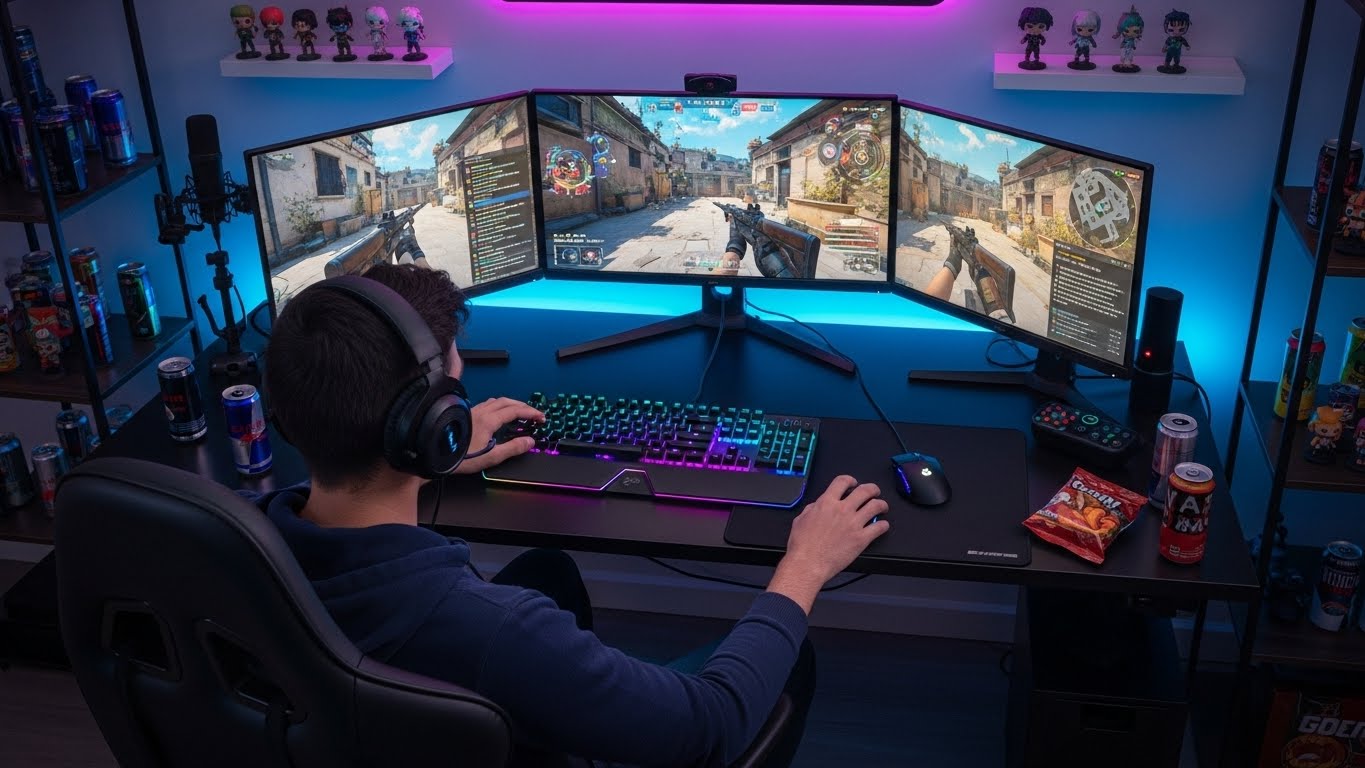Gaming has become one of the most influential and pervasive forms of entertainment in modern society. From humble beginnings with simple pixelated graphics to today’s immersive, cinematic experiences, gaming has grown into a multi-billion-dollar industry that captivates millions of players worldwide. This blog explores the evolution of gaming, its cultural and social impact, technological advancements, and why gaming continues to shape the future of entertainment.
The Origins of Video Games
The history of gaming dates back to the 1950s and 1960s when the first electronic games were developed. Early examples like Tennis for Two, created by William Higinbotham in 1958, and Spacewar!, developed at MIT in 1962, laid the groundwork for interactive entertainment. These games were rudimentary by modern standards but showcased the potential of computers for recreation.
The 1970s marked a turning point with the rise of arcade games. Pong, developed by Atari in 1972, became a cultural phenomenon and brought video games into mainstream consciousness. Arcades became social hubs where players competed for high scores, fostering a competitive spirit that continues in modern esports.
The Golden Age of Gaming
The late 1970s and early 1980s are often referred to as the “Golden Age of Gaming.” During this period, classic titles like Pac-Man, Donkey Kong, and Space Invaders dominated arcades and captured the imagination of players worldwide. Home consoles also began to emerge, with the Atari 2600 bringing gaming into living rooms and creating a new market for video game software.
This era was also notable for the introduction of game franchises that would endure for decades. Iconic characters such as Mario, introduced by Nintendo, became household names, and game mechanics established during this time still influence modern game design. The Golden Age was more than just technological advancement; it set the foundation for gaming culture, fostering communities and shared experiences around video games.
The Rise of Home Consoles
The transition from arcades to home consoles in the 1980s and 1990s revolutionized gaming. Nintendo’s NES (Nintendo Entertainment System) and Sega’s Genesis dominated the market, offering players the opportunity to enjoy high-quality games without leaving their homes. This era saw the birth of some of the most beloved franchises in gaming history, including The Legend of Zelda, Sonic the Hedgehog, and Final Fantasy.
The 1990s also witnessed significant improvements in graphics and gameplay complexity. The introduction of 3D gaming with consoles like the Sony PlayStation and Nintendo 64 opened new possibilities for storytelling and immersion. Players could now explore expansive worlds, engage in realistic combat, and experience narratives on a cinematic scale.
The Emergence of PC Gaming
While consoles dominated living rooms, PC gaming developed a strong foothold among enthusiasts who valued customization, high-performance hardware, and innovative gameplay. Games like Doom, Quake, and Warcraft introduced online multiplayer experiences that connected players around the globe.
PC gaming also encouraged modding communities, where players could modify and enhance games, creating new content and experiences. This culture of creativity not only extended the lifespan of games but also influenced developers to support user-generated content in future titles.
The Evolution of Online Gaming
The late 1990s and early 2000s marked a major shift with the advent of widespread internet connectivity. Online gaming transformed how people played and interacted with video games. Massively multiplayer online role-playing games (MMORPGs) such as World of Warcraft allowed thousands of players to inhabit virtual worlds simultaneously, forging friendships, rivalries, and communities.
Online multiplayer also gave rise to competitive gaming and esports. Titles like Counter-Strike, StarCraft, and League of Legends became global phenomena, drawing millions of viewers to tournaments and streaming platforms. Today, esports is a professional industry with players, coaches, sponsors, and international competitions.
The Impact of Mobile Gaming
The proliferation of smartphones in the late 2000s introduced gaming to a broader audience. Mobile games like Angry Birds, Candy Crush, and Pokémon GO made gaming accessible to people who might never have picked up a console or PC. The convenience of playing anywhere, combined with simple, engaging gameplay, expanded the gaming market exponentially.
Mobile gaming has also innovated in areas such as augmented reality and social integration. Games now often include social features, events, and collaborative challenges, blurring the lines between gaming and social media. This accessibility has further cemented gaming as a mainstream form of entertainment.
Gaming as a Cultural Phenomenon
Beyond technology and entertainment, gaming has become a cultural force. Video games influence art, music, fashion, and storytelling. Popular franchises inspire films, books, and merchandise, creating multimedia universes that engage fans across various platforms.
Gaming culture also fosters communities and identity. Online forums, social media groups, and streaming platforms allow players to share experiences, strategies, and fan creations. Cosplay, conventions, and tournaments celebrate gaming as a shared passion, bringing together people from diverse backgrounds.
The Psychology of Gaming
Gaming is not only entertaining but also engages cognitive and emotional processes. Studies have shown that games can improve problem-solving skills, strategic thinking, and hand-eye coordination. Story-driven games stimulate imagination and empathy, allowing players to experience perspectives different from their own.
However, gaming is also complex in its psychological impact. While it can provide relaxation, social connection, and personal achievement, excessive gaming may lead to addiction or social withdrawal. Understanding this balance is crucial for players, parents, and educators.
Technological Advancements Shaping Gaming
Modern gaming thrives on cutting-edge technology. High-definition graphics, realistic physics engines, and artificial intelligence have transformed gameplay into visually stunning and interactive experiences. Virtual reality (VR) and augmented reality (AR) push immersion further, allowing players to step inside digital worlds.
Cloud gaming and streaming services are redefining accessibility, removing the need for expensive hardware. Gamers can now play high-quality games on modest devices, expanding the reach and inclusivity of the medium.
The Business of Gaming
The gaming industry is a major economic powerhouse. Revenue comes from game sales, downloadable content, in-game purchases, subscriptions, and esports events. Companies like Nintendo, Sony, Microsoft, and Tencent are global leaders, driving innovation and competition.
Marketing strategies, community engagement, and franchise development play a crucial role in a game’s success. Understanding player behavior and trends is essential, as gamers increasingly demand quality experiences, social connectivity, and ethical practices from developers.
The Future of Gaming
The future of gaming promises further evolution and integration with technology. Artificial intelligence will enhance NPC behavior, procedural generation will create infinite worlds, and virtual reality may become a standard medium. Cross-platform play, cloud gaming, and mobile integration will continue to make gaming more accessible and inclusive.
Gaming will also continue to influence society in unexpected ways. Educational games, serious games for training, and games addressing social issues demonstrate that gaming is more than entertainment—it can be a tool for learning, communication, and social change.
Conclusion
Gaming has come a long way from its early experiments on oscilloscopes to the immersive, global phenomenon it is today. It has shaped culture, technology, and social interaction, providing entertainment, challenge, and community for millions of people worldwide. As technology advances and creativity flourishes, gaming will undoubtedly continue to evolve, captivate, and inspire generations to come.
The world of gaming is vast, diverse, and ever-changing, making it not just a pastime, but a cultural cornerstone that reflects the ingenuity and imagination of humanity itself.



